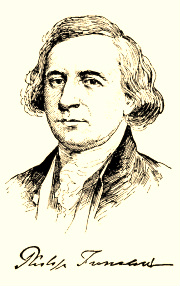
Philip Freneau was an outspoken critic of British rule. He became to many the "Poet of the Revolution." To George Washington, he was that "rascal Freneau" (which term in the 1700's was a harsh criticism).
Living from 1752-1832, Freneau's career was checkered. A journalist, editor and writer for the the Freeman's Journal [Philidelphia] from 1781-1784, he was pain the side of the Federalists and their concept of American form of Government. He is considered more of Jeffersonian. His fortunes fell. He turned to the mercant marine, serving as ship's captain for many years.
He is best remembered for his poetry. In many respects, his poetry anticipates the Romanicism poetry of the early 1800's.
He is often known as the Poet of American Independence: Freneau provides incentive and inspiration to the revolution by writing such poems as "The Rising Glory of America" and "Pictures of Columbus." Freneau is often also known as Father of American Poetry: His major themes are death, nature, transition, and the human in nature. All of these themes become important in 19th century writing. His famous poems are "The Wild Honey-Suckle" (1786), "The Indian Burying Ground" (1787), "The Dying Indian: Tomo Chequi" (1784), "The Millennium" (1797), "On a Honey Bee" (1809), "To a Caty-Did" (1815), "On the Universality and Other Attributes of the God of Nature," "On the Uniformity and Perfection of Nature," and "On the Religion of Nature" (the last three written in 1815).
Source: Reuban, Paul. Perspectives in American Literature, U of California at Stanislaus, 3 October 2011. Web, 9 August, 2013. [By permission]
Living from 1752-1832, Freneau's career was checkered. A journalist, editor and writer for the the Freeman's Journal [Philidelphia] from 1781-1784, he was pain the side of the Federalists and their concept of American form of Government. He is considered more of Jeffersonian. His fortunes fell. He turned to the mercant marine, serving as ship's captain for many years.
He is best remembered for his poetry. In many respects, his poetry anticipates the Romanicism poetry of the early 1800's.
He is often known as the Poet of American Independence: Freneau provides incentive and inspiration to the revolution by writing such poems as "The Rising Glory of America" and "Pictures of Columbus." Freneau is often also known as Father of American Poetry: His major themes are death, nature, transition, and the human in nature. All of these themes become important in 19th century writing. His famous poems are "The Wild Honey-Suckle" (1786), "The Indian Burying Ground" (1787), "The Dying Indian: Tomo Chequi" (1784), "The Millennium" (1797), "On a Honey Bee" (1809), "To a Caty-Did" (1815), "On the Universality and Other Attributes of the God of Nature," "On the Uniformity and Perfection of Nature," and "On the Religion of Nature" (the last three written in 1815).
Source: Reuban, Paul. Perspectives in American Literature, U of California at Stanislaus, 3 October 2011. Web, 9 August, 2013. [By permission]
|
For a thorough treatment of Freneau, visit Prof. Donna Campbell's website at Washington State University.
|
